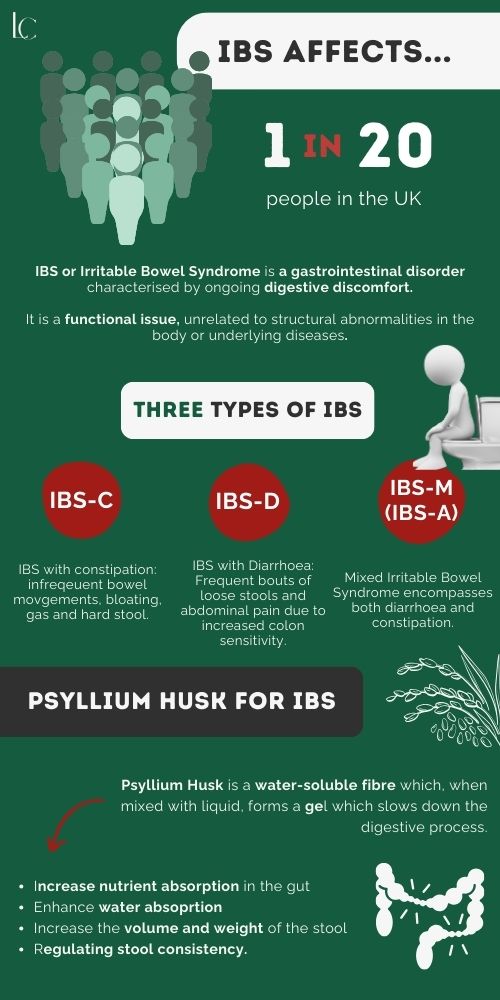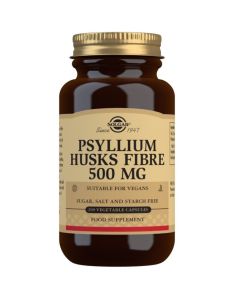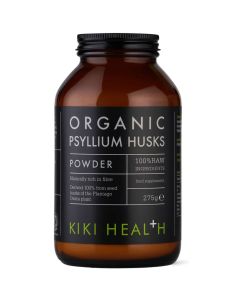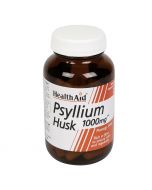
Does Psyllium Husk Help IBS?
Irritable Bowel Syndrome (IBS) can be a daily battle for millions, affecting between 4 and 10% of the global population. It often causes discomfort, bloating, constipation, or diarrhoea or has unpredictable symptoms, making daily tasks much harder.
In this blog, we delve into the world of IBS, exploring its different types, potential triggers, and shedding light on some supplements that have shown promise in alleviating symptoms, including psyllium husk.
Whether you are amongst the estimated 1 in 20 people in the UK grappling with IBS, or simply wanting to explore more about this common gastrointestinal disorder, we aim to help you regain control over your digestive health!
What is IBS?
Irritable Bowel Syndrome, known as IBS, is a prevalent gastrointestinal disorder featuring ongoing digestive discomfort. It is a functional issue, unrelated to structural abnormalities in the body or underlying diseases.
Although IBS is a chronic condition, it is not life threatening. With effective management, most individuals can alleviate their symptoms and sustain a good quality of life. Nevertheless, diagnosing and handling IBS can be complex and challenging, as its precise cause remains unclear and varies among individuals.
What are the different types of IBS?
IBS can be characterised into three main types, characterised on the predominant symptoms experienced by individuals.
What is IBS-C:
IBS-C or irritable bowel syndrome with Constipation, is a prevalent type of IBS characterised by infrequent bowel movements, making passing stool difficult and often requiring straining.
This form of IBS is associated with slower digestive system and intestinal contractions, inflammation, and an altered gut-brain axis, which results in incorrect signals for regulating intestinal movements. Stools in individuals with IBS-C are typically at least 25% hard or lumpy and less than 25% loose, often accompanied by bloating and abdominal discomfort due to increased gas.
What is IBS-D:
IBS-D or irritable bowel syndrome with Diarrhoea, is more prevalent in women than men, and features frequent bouts of loose stools and abdominal pain. This is due to increased colon sensitivity. Triggers like stress, bacteria and certain foods cause rapid, excessive intestinal contractions, disrupting water absorption and resulting in watery stools, pain, diarrhoea, and increased gas.
What is IBS-M (also IBS-A)
IBS-M, or Mixed Irritable Bowel Syndrome, encompasses both diarrhoea and constipation, often occurring simultaneously or alternating. Individuals with IBS-M endure symptoms of both IBs-C and IBS-D, such as abdominal pain, cramping, frequent toilet visits, fatigue, and sleep disturbances. Whilst the exact cause is uncertain, it could result from factors like inflammation, dysfunction of the gut-brain axis, stress, gut microbiome, and dietary factors.
What causes IBS:
Whilst the exact cause of IBS remains uncertain, factors like muscle contractions in the intestines, nerve signalling between the gut and the brain (gut-brain axis) and past GI infections can all play a role. Strong, prolonged contractions may lead to flatulence, bloating and diarrhoea, while weak contractions can result in firm, dry stools.
IBS-D: This type is associated with increased colon sensitivity, inflammation of the gut, stress, and dietary triggers. These lead to rapid and excessive intestinal contractions resulting in diarrhoea.
IBS-C: This type of IBS can be caused by slower intestinal contractions, decreased gut motility, and issues with water absorption in the colon which can contribute to constipation.
IBS-M: This type of IBS combines elements of both IBS-C and IBS-D, suggesting a complex interplay of factors which cause alternating diarrhoea and constipation. This can be increased sensitivity and altered nerve signalling between the gut and the brain for example.
Post-infectious IBS: Some individuals may develop IBS symptoms after a gastrointestinal infection, which is often linked to chronic inflammation, changes in the gut flora, and increased intestinal permeability, resulting in diarrhoea and vomiting.
Diverticulitis-Related IBS: A history of diverticulitis, a condition involving inflammation in the large intestine, can increase the risk of developing IBS, which may lead to abdominal pain and constipation.
Psyllium Husk for IBS
Psyllium Husk is a soluble fibre derived from the seeds of the Plantago ovata plant. Psyllium is predominantly a water-soluble fibre, which, when mixed with liquid, forms a gel that slows down the digestive process. Not only does this enhance nutrient absorption in the gut, but also increases the volume and weight of the stool, aiding in peristalsis (intestinal contractions). This combination of peristalsis and the gel-like consistency of the soluble fibre can help alleviate symptoms of constipation and normalise stool consistency.
Studies have shown that Psyllium Husk is more effective at lessening the frequency and intensity of IBS-D symptoms than other options like Bran. It does this by enhancing water absorption in the digestive tract, resulting in firmer stools. Additionally, Psyllium Husk has been observed to reduce inflammation in the gut, positioning it as a preferred choice over other frequently employed fibre supplements for managing IBS.
Conflicting findings have emerged regarding the efficacy of Psyllium Husk for IBS. Whilst some studies suggest it can provide benefits for both IBS-C and IBS-D, other research indicates mixed or inconclusive results. The variations in these findings underscore the complex and individual nature of IBS, where what works for one person may not be as effective for another.
Psyllium Husk Recommendations for IBS:
The Solgar Psyllium Husk Fibre Vegetable Capsules are naturally high in soluble fibre and work with your daily rhythm. These are suitable for vegans, vegetarians, kosher, and halal diets.
The KIKI Health Organic Psyllium Husk Powder provides a powdered form of psyllium husk that is easy to digest, gluten and wheat free. Take 1 heaped teaspoon to any drink or smoothie, or sprinkle on and mix with foods to help with digestion.
Summary:
- IBS can affect millions globally, causing discomfort, bloating, constipation, diarrhoea and unpredictable symptoms.
- IBS can come in forms including IBS-C which causes constipation, IBS-D which causes diarhhoea and IBS-M which is a combination of the two.
- Psyllium Husk, a soluble fibre can aid in IBS management by regulating bowel movements and normalising stool consistency.
- Psyllium Husk has shown promise in alleviating both constipation and diarrhoea symptoms, however research results on its effectiveness can vary.
Commonly Asked Questions:
Are there side effects to Psyllium Husk?
Psyllium Husk is generally considered safe for most people when taken as directed. However, like many dietary supplements, or fibre sources, it can cause some side effects in some individuals including gastrointestinal discomfort like gas, bloating or abdominal pain. This can often be reduced by starting at a low dose and gradually increasing it over time.
What is the dosage of Psyllium Husk for IBS?
Common dosages of psyllium husk are around 5-10g per day. It is advisable to have this with a meal and plenty of water. Once your body has adjusted to 5g people can increase this gradually if their body tolerates it. It is advisable to follow the instructions on the packaging or from your healthcare professional.

Saarah Mengrani







